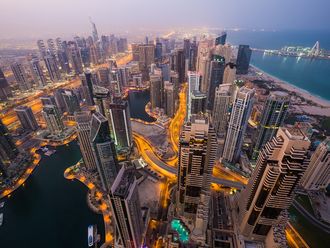
The Dubai real estate market has withered an increase in construction disputes as Dubai moves towards the World Expo 2020 amid a sluggish global economy, regional geopolitical turbulence and lower oil prices. The majority of these disputes centre around delays and cancellations of projects and construction defects.
In this article we review the mechanisms in place to settle such disputes in Dubai, in particular construction defects.
Construction defects concern defects and problems within built buildings, such as villas, towers, etc. For example, water seepage through concrete, foul smell emanating from air-conditioning units, etc.
Broadly speaking, disputes regarding construction defects are typically between unit owners and developers, or between developers and contractors.
Claims by unit owners
Pursuant to Article 26 of Law No. 27 of 2006, a developer remains liable for 10 years from the date of a project’s completion certificate to repair and cure any defects in the structural elements of the project notified to the developer by the owners’ association (OA) or a unit owner.
A developer remains liable for 10 years from the date of a project’s completion certificate to repair and cure any defects in the structural elements of the project.
A developer is also liable under Article 26 for one year from the date of the project’s completion certificate to repair or replace defective installations in the project. This includes mechanical and electrical works and sanitary and plumbing installations.
As such, if a dispute arises between a unit owner and a developer regarding a construction defect, which falls into either of these categories, the owner should attempt to resolve the dispute amicably by reminding the developer of its statutory obligations, failing which owners can resort to court proceedings to enforce their statutory rights.
Claims by developers and later by unit owners
Under the UAE Civil Code, a developer has a claim against the contractor and the supervising architect for 10 years from the date of delivery of the work if either the building suffers total or partial collapse or there is a defect that threatens the stability or safety of the building. The benefit of such a claim can be transferred from a developer to the unit owners upon completion of the building.
The remedy for such a claim is compensation, and crucially the obligation to compensate applies even if the building collapse/defect arises from a defect in the land or the developer consented to the construction of the defective building.
Arbitration
In Dubai the most popular dispute resolution mechanism in construction contracts is arbitration before the Dubai International Arbitration Centre (DIAC). DIAC was established by the Dubai Chamber of Commerce and Industry, which was in effect a rebranding of the commercial conciliation and arbitration services that had been available in Dubai since 1994. DIAC has issued arbitration rules and maintains a list of arbitrators.
DIAC was established by the Dubai Chamber of Commerce and Industry, which was in effect a rebranding of the commercial conciliation and arbitration services that had been available in Dubai since 1994.
Conveniently, another dispute resolution venue for construction contracts is at the Dubai International Financial Centre-London Court of International Arbitration (DIFC-LCIA), which is based in DIFC.
Foreign arbitration institutions, most notably the International Chamber of Commerce’s court of arbitration, are also often used as a dispute resolution mechanism in large construction contracts. Importantly, the UAE has adopted the New York Convention on the Recognition and Enforcement of Foreign Arbitral Awards. The Convention requires courts of contracting states to give effect to private agreements to arbitrate and to recognise and enforce arbitration awards made in other contracting states.
Court proceedings
In Dubai, if the parties to a construction contract cannot resolve a dispute amicably and if no arbitration clause is contained in the contract, the dispute is typically referred to court. The court system in Dubai consists of a Court of First Instance, a Court of Appeal and a Court of Cassation.
Proceedings are started by filing a claim in the relevant court office on payment of the court fee. On application by the claimant, payment of court fees can be deferred in exceptional cases. The court fee depends on the value of the claim, and has a maximum cap of Dh40,000. This fee is payable either on an application for provisional relief or on filing the main lawsuit.
Foreign arbitration institutions, most notably the International Chamber of Commerce’s court of arbitration, are also often used as a dispute resolution mechanism in large construction contracts.
The claim must meet procedural requirements and include the names and addresses of the parties to the action and details of the claim. Documents in support of the claim are usually annexed to the claim and must be translated into Arabic. The court issues a summons with a hearing date endorsed on it for service on the defendant, with a copy of the claim and any supporting documents filed by the claimant.
Once an answer has been filed, the trial is adjourned for the claimant to respond. Further adjournments are given so that memoranda can be filed by the parties. Once the court believes that the case has been sufficiently pleaded, it reserves the matter for judgment. The entire proceeding is based on written submissions supported by documentary evidence. The court usually appoints an expert to assist it and usually accepts the expert’s report.
The complex mix of economic and political factors at play in the Middle East will lead to a continued increase in disputes this year as businesses pause certain commitments. Resulting disputes can be referred to and resolved through Dubai courts or by arbitration in Dubai.











